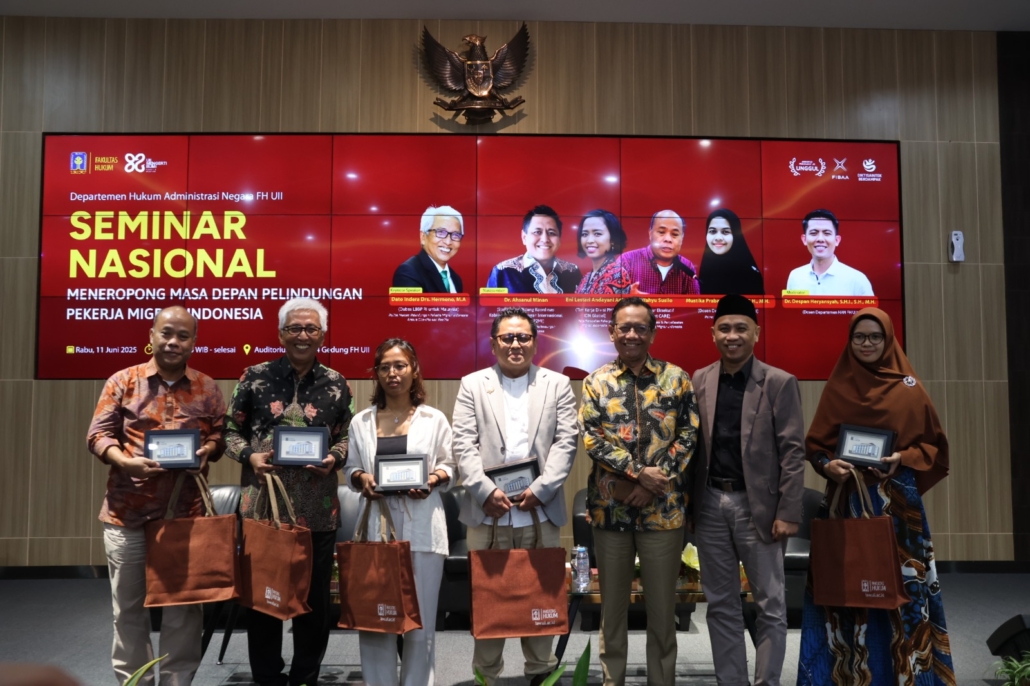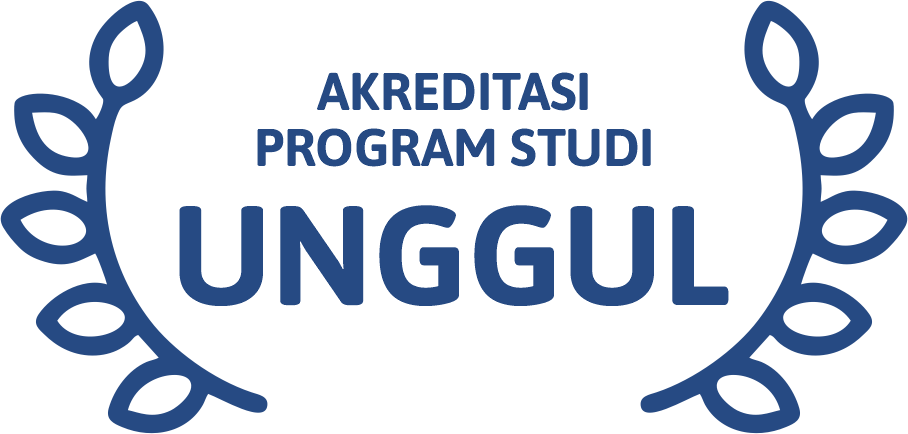National Seminar : Exploring the Future of Indonesian Migrant Worker Protection

Sleman, 11 June 2025 — The Department of State Administrative Law (HAN) of the Faculty of Law, Universitas Islam Indonesia (UII), held a National Seminar titled “Exploring the Future of Indonesian Migrant Worker Protection” at the 4th Floor Auditorium of the Faculty of Law, UII campus, Jl. Kaliurang Km. 14.5, Sleman, D.I. Yogyakarta. More than 350 participants attended the event, both in person and online. The enthusiasm was evident from the diverse attendance, which included activists, practitioners, academics, bureaucrats, and even former Indonesian Migrant Workers (PMI) from various countries.
The national seminar was opened with remarks from the Dean of the Faculty of Law, UII, Prof. Dr. Budi Agus Riswandi, S.H., M.Hum. He conveyed that the issue of PMI is a strategic one because, in addition to being contributors to the nation’s foreign exchange, they are also a vulnerable group that the state must protect. “Hopefully, the results of this national seminar will serve as valuable input for the drafting of the Bill on the Protection of Indonesian Migrant Workers (RUU PPMI),” he stated.
The event was moderated by Dr. Despan Heryansyah, S.H.I., S.H., M.H. The keynote speaker was Dato Indera Drs. Hermono, M.A., the Ambassador Extraordinary and Plenipotentiary of the Republic of Indonesia to Malaysia. Meanwhile, material presentations were delivered by Dr. Ahsanul Minan, Special Staff to the Minister for the Protection of Indonesian Migrant Workers; Wahyu Susilo, Executive Director of Migrant CARE; Eni Lestari Andayani Adi, from the PMI Division Working Team of the Indonesian Diaspora Network (IDN) Global and Chairwoman of the International Migrants Alliance; and Mustika Prabaningrum Kusumawati, S.H., M.H., a lecturer from the Department of State Administrative Law, Faculty of Law, UII.
In his speech, Dato Indera Drs. Hermono highlighted that the problem with PMI protection in Indonesia is caused by a long-entrenched, placement-oriented perspective. Consequently, PMI is viewed merely as an economic function (economic interest). Therefore, PMI must be seen as subjects, so that their protection is based on the perspective of human dignity.
“If we prioritize a placement-oriented view that focuses only on the Memorandum of Understanding (MoU), Indonesia’s bargaining power will be weaker than that of the destination country. However, if protection is prioritized, it will grant Indonesia a higher bargaining power, as demonstrated by the practice in Malaysia,” he asserted.
Moving on to the presentation by Dr. Ahsanul Minan, he noted the ongoing institutional transformation from the former BP2MI (Indonesian Migrant Worker Protection Agency) to the Ministry for the Protection of Indonesian Migrant Workers (KP2MI). He further emphasized the implementation of policy reforms based on service digitalization, increased legal and financial literacy, and the integration of cross-border protection desks. As Dr. Ahsanul Minan stated in his presentation, “Protection is not about shelter, but about the system. We need a system that is professional, responsive, and empathetic towards migrant workers as full citizens, not objects of pity.”
Meanwhile, Eni Lestari, in the national seminar forum, highlighted the government’s absence in providing protection for PMI thus far. Eni Lestari explained that PMI issues do not occur at just one stage but at every stage, from pre-departure and during placement to their return to their home country. This is caused by the weak bargaining position of PMI, who are often identified as cheap labor, with wages even lower than the standard for local workers in the destination country. Furthermore, Eni Lestari explained the harsh reality that, “PMI return home injured, unemployed, and are considered ‘former laborers’ by their communities.” For Eni Lestari, a change in the Law on PMI Protection is necessary, one that is more aspirative and participatory by involving PMI.
From his perspective, Wahyu Susilo explained that the recent surge in PMI is a result of the COVID-19 Pandemic, which has triggered a wave of migration to various countries. “Human trafficking is now expanding, where it previously targeted people with weak economies, the poor, and the uneducated. Now, it has shifted to people with adequate economies, from urban areas, and who are educated. This is because victims are taken hostage by perpetrators to extort their parents. Moreover, this situation is exacerbated by the inconsistency of stop-and-go policies during the COVID-19 pandemic,” he concluded.
According to Wahyu Susilo, the most vulnerable PMIs are those who work as Domestic Workers (PRT), a sector dominated by women, whose welfare remains questionable. Wahyu Susilo stressed the importance of synchronizing national laws and regulations with international covenants such as the International Labour Organization Convention 189.
Meanwhile, Mustika Prabaningrum, from an academic perspective, highlighted the wide gap between the ideal and reality. Ideally, PMI should receive information, training, fair work contracts, and safety guarantees. In reality, many are sent undocumented, are unaware of their rights, and fall victim to the practice of overcharging. “Systemic reform must start from the upstream, namely through the empowerment of migrant villages and vocational training relevant to global labor market needs,” Mustika emphasized in her presentation.
In addition to the national seminar, the Department of State Administrative Law, Faculty of Law, UII also held a national Call for Paper conference, attended by 29 institutions, including Universitas Gadjah Mada, the National Research and Innovation Agency (BRIN), and the Coordination of Former Indonesian Migrant Workers (KPPMI). Zakiul Fikri, S.H., M.A., LL.M, in his remarks as the Committee Chair, mentioned that 43 papers that passed the selection process from various participating institutions were presented at the event, divided into two online chambers, one hybrid chamber, and two offline chambers.
Thus, the agenda of the national seminar and the presentation of scientific papers were inclusive, attended by various stakeholders to reflect on and provide input to the Government on what policies are appropriate to improve the protection for PMI in the future.







